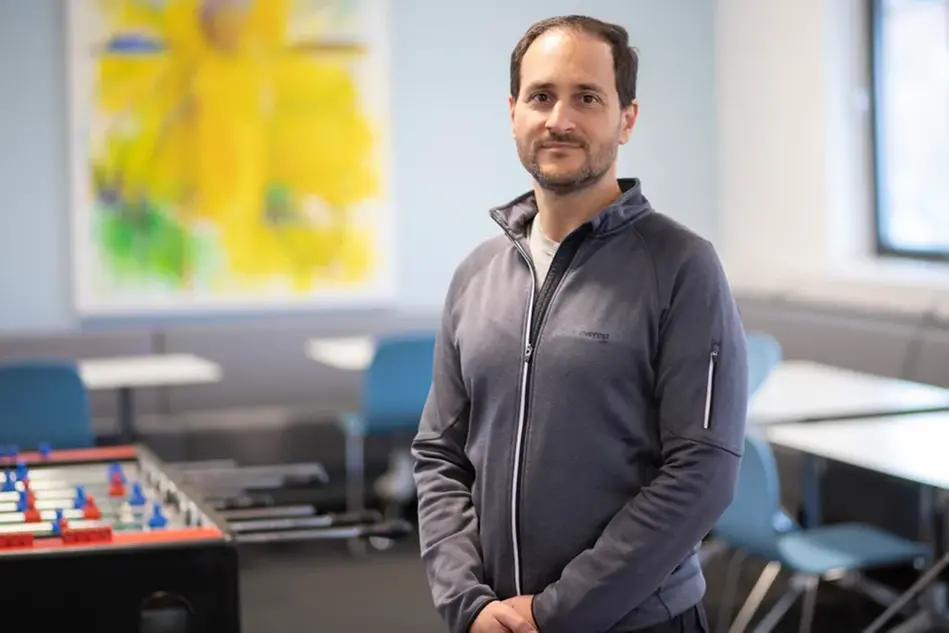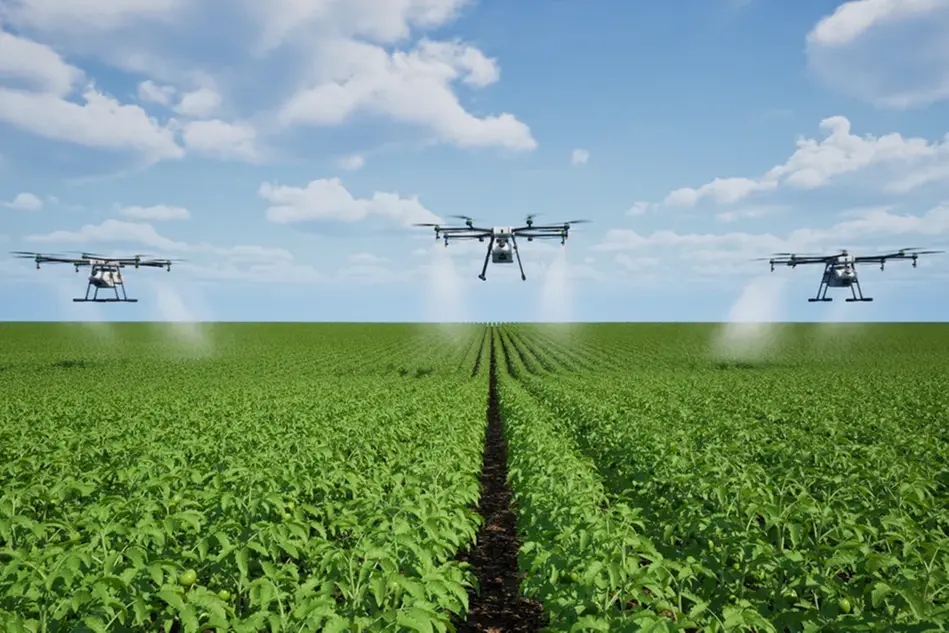Professor’s portrait: From the University’s first own PhD graduate to one of the most influential scientists in the world
How can autonomous systems and networked robotics help solve some of today’s most pressing societal issues? Edison Pignaton de Freitas, newly appointed Professor of Autonomous Systems at Halmstad University, works to create advanced systems that can improve both defence strategies and agricultural technologies.
”Research is the most important thing! But another important aspect of being a professor is transmitting cutting-edge knowledge to the students.”
Edison Pignaton de Freitas, Professor
Edison Pignaton de Freitas began his academic journey as an engineering student in Brazil around the turn of the millennium. After completing his undergraduate studies, he embarked on a career in the Brazilian Army, where he specialised in defence-related technologies.
“I worked as a computer engineer in the army for 15 years, working with unmanned aerial systems and other defence systems”, Edison Pignaton de Freitas explains.
His time in the army sparked a deep interest in researching various defence systems. This passion led him to Sweden, where he pursued a PhD at Halmstad University, becoming the first to receive a doctoral degree at the University. His dissertation on the use of unmanned aerial vehicles as mobile sensor nodes laid the groundwork for his future research in networked robotics back in Brazil.
Now, Edison Pignaton de Freitas has returned to his Swedish alma mater, Halmstad University, as a Professor of Autonomous Systems, ready to continue his impactful research.

Edison Pignaton de Freitas, Professor of Autonomous Systems.
From defence systems to precision agriculture
Edison Pignaton de Freitas’s research in autonomous systems and networked robotics covers a wide range of subjects with significant implications for both agriculture and defence. Autonomous systems, which include self-driving vehicles and drones, improve efficiency and reduce the need for human intervention, allowing for more precise and reliable operations.
For example, autonomous tractors can work tirelessly to plough fields and plant crops, while military autonomous vehicles can navigate hazardous terrains and perform complex missions without risking human lives. Drones can be used for targeted pesticide application in precision agriculture to increase crop yields and reduce waste and environmental impact. In the military, drones can be employed for surveillance and reconnaissance missions, providing critical information and enhancing security operations.
“I work in various subjects related to networked robotics systems, such as communication for mobile networks, mobile robotics, and autonomous systems like artificial intelligence, unmanned aerial systems, and the Internet of Things (IoT). Examples of my research include smart spraying systems using autonomous drones for precision agriculture and multi-drone systems for military surveillance”, Edison Pignaton de Freitas highlights.

Among other things, Edison Pignaton de Freitas researches smart spraying systems using autonomous drones for precision agriculture.
Among top two per cent of influential scientists worldwide
Edison Pignaton de Freitas’s contributions to his field have not gone unnoticed – for the past two years, he has been recognised as one of the top two per cent most influential scientists worldwide by Stanford University. This recognition is based on a comprehensive database that provides standardised information on citations and other metrics, ensuring a fair evaluation of scientific impact.
Edison Pignaton de Freitas was re-recruited to Halmstad University as a part of ELLIIT, a strategic research environment and collaboration between Halmstad University and several other Swedish universities. ELLIIT fosters collaboration in the fields of information technology and mobile communications.
“My ambition is to contribute to the network by developing high-impact projects that align with ELLIIT’s framework and possibly complementing other projects and creating fruitful cooperation with other researchers. Having recently arrived in Sweden, I am trying to establish connections with industrial partners, particularly those in the defence industry”, says Edison Pignaton de Freitas.
Research the most important thing
When asked what else is important about being a professor, besides research, Edison Pignaton de Freitas smiles and replies “Research is the most important thing! But another important aspect of being a professor is transmitting cutting-edge knowledge to the students.”
Evidently, research takes up a lot of Edison Pignaton de Freitas’s time. But what does he then do when he has some time off?
“In my free time, I like to go to the gym, jog and travel. When travelling, I always try to dive, hike or search for adventures in nature”, he finishes.
Text: Emma Swahn
Photo: Dan Bergmark (portrait), iStock (stock photo)
About Edison Pignaton de Freitas
Edison Pignaton de Freitas earned a Bachelor of Science in Computer Engineering from Instituto Militar de Engenharia in Rio de Janeiro, Brazil, in 2003, followed by a Master of Science in Computer Science from Federal University of Rio Grande do Sul in Porto Alegre, Brazil, in 2007. During this time, he gained international experience through an internship at Airbus Central Entity in France, where he worked on avionic system specification.
In 2011, Edison Pignaton de Freitas obtained his PhD in Computer Science and Engineering from Halmstad University, Sweden, with a dissertation titled “Cooperative Context-Aware Setup and Performance of Surveillance Missions Using Static and Mobile Wireless Sensor Networks”, becoming the first to graduate from Halmstad University’s postgraduate programme.
After returning to Brazil, Edison Pignaton de Freitas was appointed Captain Military Engineer Researcher in Computer Science in the Brazilian army. In 2013, he relocated to Rio Grande do Sul, where he became a senior lecturer at Universidade Federal de Santa Maria. He later transferred to the Federal University of Rio Grande do Sul, where he in 2015 began supervising PhD students and between 2020 and 2021 was Dean of International Affairs.
In 2025, Edison Pignaton de Freitas was appointed Professor of Autonomous Systems at Halmstad University, Sweden.
About ELLIIT
ELLIIT is a strategic research environment established in 2010 through funding by the Swedish government, as part of its initiative to support strong research in information technology and mobile communications. ELLIIT has four partners: Linköping University, Lund University, Halmstad University and Blekinge Institute of Technology. ELLIIT constitutes a platform for both fundamental and applied research, and for cross-fertilisation between disciplines and between academic researchers and industry experts. ELLIIT stands out through the quality and visibility of its publications, as well as its ability to attract and retain top talented researchers. It aims to be recognised as a top international research organisation.
ELLIIT achieves its goals by a judicious choice of funded focus projects, a structured process for international recruitment, a balanced way of stimulating cooperation between research areas and between the universities involved, and a proactive approach towards fostering and maintaining cooperation with Swedish industry. The overarching objective of ELLIIT is to support scientific excellence in combination with industrial relevance and impact.


